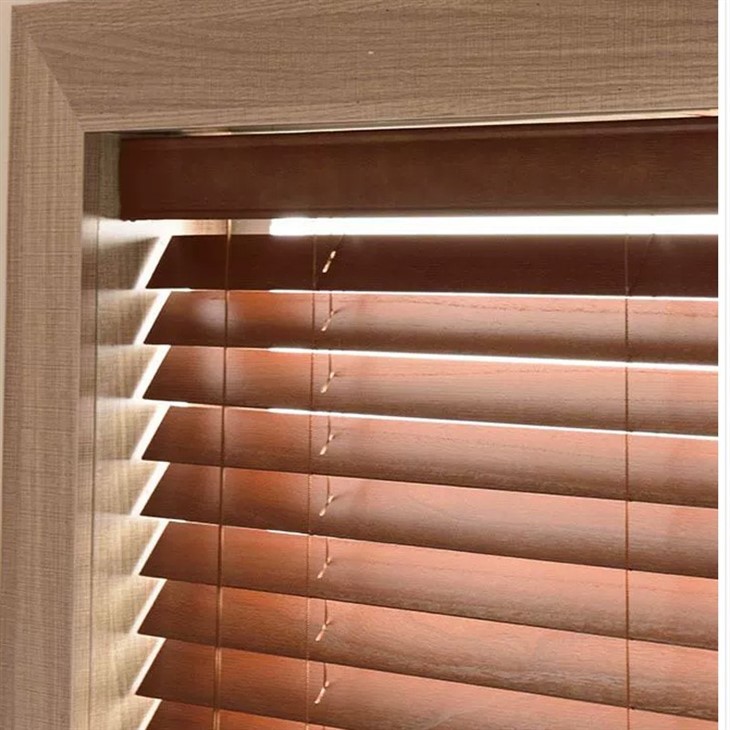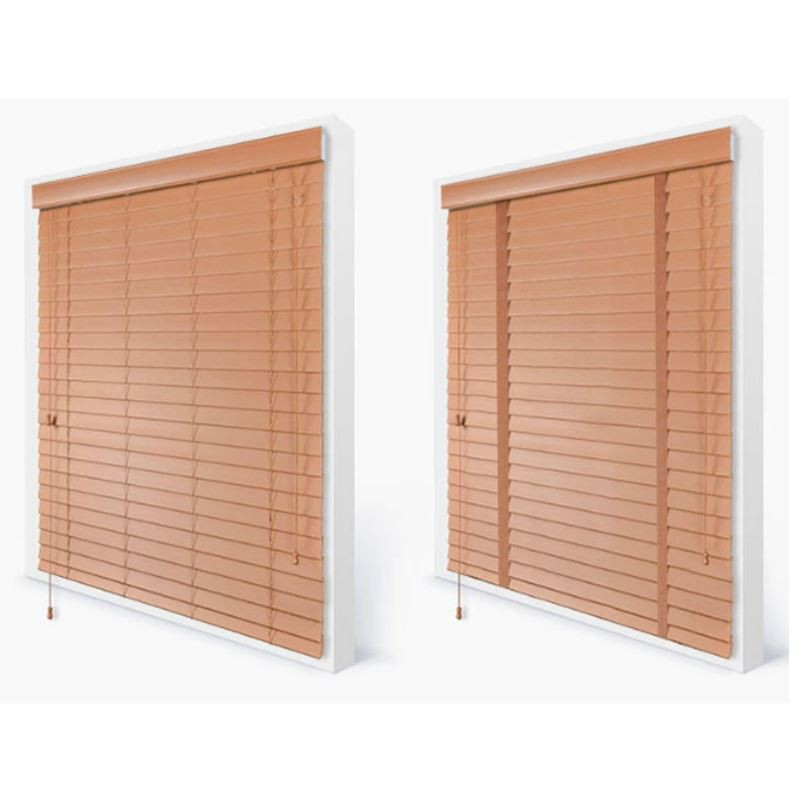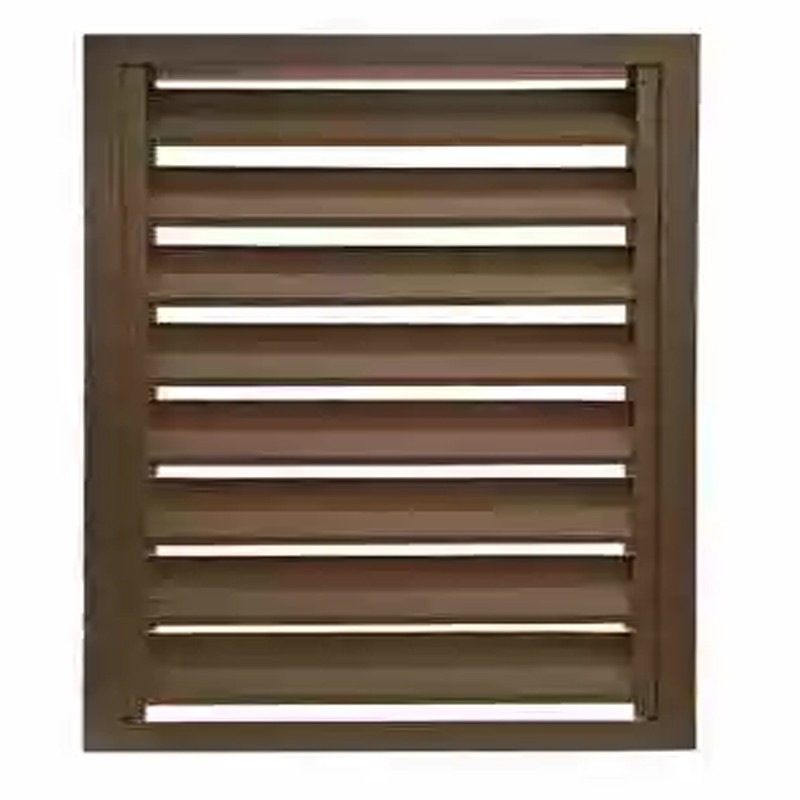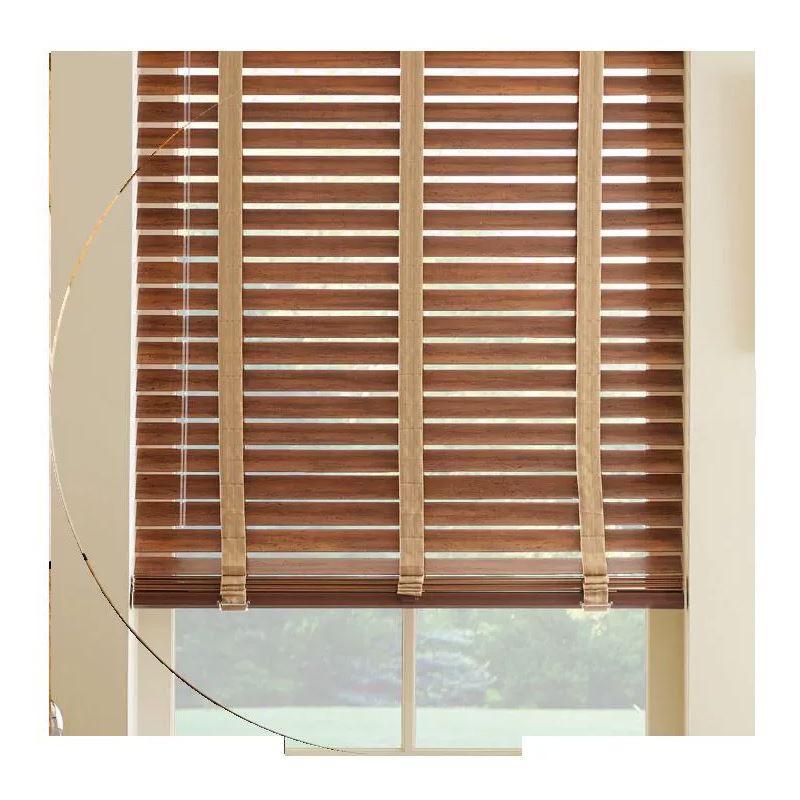WPC Louvers
WPC Louvers are a type of outdoor shading system made of a combination of wood fibers and plastic. They are designed to provide a highly functional and aesthetic solution for shading and privacy control in outdoor spaces like gardens, balconies, and patios. WPC louvers are highly resistant to rotting, decay, and moisture, which makes them an ideal choice for environments prone to harsh weather conditions. They are also very versatile and can be customized to suit different sizes, shapes and colors to fit any architectural and design style.
1.Highly weather resistant
WPC louvers have a high resistance to sunlight. They are extraordinarily defiant to deterioration from consequences of rigorous weather condition. WPC louvers go the extra mile to resist moisture, mold, fading, swelling and continue to maintain a great look year after year.
2.High performance and durability
Manufactured from a blend of wood and plastic, WPC louvers combine the beauty of wood with the durability of an engineered composite. These high-performance sturdy composite louvers are non water-absorbent, 100% termite resistant and fade resistant which makes them highly durable compared to other materials.
3.High strength
After a long time of use, you will notice that louvers made from traditional wood start to crack and warp. WPC louvers do not crack as they have good strength, and can withstand wind pressure resulting in a durable product for many years.Addition of a coupling agent makes WPC more strong and sturdy.
4.Low maintenance
Composite louvers are a low maintenance feature. Once installed, they require little care to keep them in good condition. You needn’t paint or stain them to maintain their condition.
Why Choose Us?
High quality
Our products are manufactured or executed to very high standards, using the finest materials and manufacturing processes.
Rich experience
Dedicated to strict quality control and attentive customer service, our experienced staff is always available to discuss your requirements and ensure complete customer satisfaction.
Quality control
We have professional personnel to monitor the production process, inspect the products and ensure that the final product meets the required quality level standards, guidelines and specifications.
24h online service
We try and respond to all concerns within 24 hours and our teams are always at your disposal in case of any emergencies.
Types of WPC Louvers

Residential WPC louvers
Residential WPC louvers are a stylish and practical addition to any home. Made from a combination of wood and plastic, they offer the perfect balance of durability and aesthetics. WPC louvers allow for easy ventilation and natural light while also providing privacy and shade. They are resistant to moisture, fading, and insects, making them ideal for use in outdoor spaces.
Commercial WPC louvers
Commercial WPC louvers are a stylish and durable solution for privacy screening, ventilation, and sun protection. Made from a combination of wood and plastic, these louvers are resistant to moisture, weathering, and termites, making them ideal for both indoor and outdoor applications.


Modern art WPC louver
The modern art WPC louver is an innovative and stylish solution to outdoor shading. Made from wood-plastic composite materials, it offers both the natural look and durability of wood with the low-maintenance benefits of plastic. Its unique design allows for adjustable levels of light and privacy, making it the perfect choice for porches, patios, and balconies.
WPC wall louvers
WPC wall louvers are a sustainable and eco-friendly alternative to traditional wooden louvers. Made from a mixture of wood fibers, plastic, and additives, these louvers offer superior durability, weather resistance, and low maintenance requirements. In addition, they are available in a range of colors and styles, allowing architects and designers to create unique and modern façade designs.


Material of WPC Louvers
WPC louvers are made from a combination of wood fiber and plastic. The wood fiber imparts natural texture and strength to the material, while the plastic provides resistance to weathering, rotting and insects. The combination of these two materials results in a strong and durable product that is resistant to moisture, heat and UV radiation. WPC louvers are available in various colors and patterns, making them a popular choice for both residential and commercial applications.
Application of WPC Louvers
Privacy screens
WPC louvers can be used to create stylish and functional privacy screens in outdoor spaces. They can be customized to fit any space and can be designed to match the existing decor of the space. Louvers can be fixed or adjustable, depending on the level of privacy required.
Sunshades
WPC louvers provide excellent protection from the sun's harmful UV rays. They can be used to create stylish sunshades in outdoor living spaces such as patios, decks, and balconies. Louvers can be adjusted to control the amount of sunshine entering the space.
Ventilation
Louvers are also excellent for providing ventilation in outdoor spaces. They can be used as air vents in outdoor kitchens, barbeques, and other outdoor living spaces to help control temperature and humidity levels.
Aesthetics
WPC louvers can be used for aesthetic purposes as well. They are available in a variety of colors and textures, making them a great addition to any outdoor decor. Louvers can be designed to complement the existing features of the space and can be used to create focal points or add visual interest to the area.
Process of WPC Louvers




1.Mixing of raw materials
The first step in the process of WPC louvers manufacturing is the mixing of raw materials. The materials used in the production of WPC louvers include wood fibers, plastic pellets, and other additives such as lubricants, pigments, and UV stabilizers. The materials are mixed thoroughly in a mixer to ensure an even distribution of the components in the mix.
2.Extrusion
The mixed materials are then fed into an extruder where they are melted and forced through a die to form the shape of the louvers. The combination of heat and pressure results in a homogenous mixture that is strong, durable, and warp-resistant.
3.Cooling and cutting
Once the extrusion process is complete, the WPC louvers are passed through a cooling chamber to cool them down to room temperature. After the cooling process, the louvers are cut to the required length using a saw.
4.Finishing
After cutting, the louvers are then sanded and finished to achieve a smooth and polished surface. This involves the use of abrasives to remove any rough edges and achieve a uniform appearance. The finishing process can also include the application of a surface coating to enhance the durability and appearance of the louvers.
5.Quality control
The final step in the process of WPC louvers manufacturing is quality control. This involves a series of tests to ensure that the products meet the required standards for quality, strength, and durability. The louvers are subjected to tests such as impact resistance, colorfastness, and moisture absorption to ensure that they are fit for purpose.
Components of WPC Louvers
Base material
The base material for WPC Louvers is a composite blend of wood fiber and plastic resin. The wood fiber provides strength and rigidity, while the plastic resin adds durability and weather resistance.
Louver frame
The frame of the louver is made from extruded aluminum, providing a lightweight yet sturdy structure that can support the weight of the louvers.
Louver blades
The louvers themselves are made from the WPC composite material and are available in a wide range of colors and finishes. The blades are designed to provide maximum durability, strength, and weather resistance.
Blade holder
Blade holders are used to secure the louvers to the frame, providing a stable and secure installation. These are typically made of a high-strength plastic material.
Control mechanism
For adjustable louvers, a control mechanism is required to adjust the angle of the blades. This mechanism consists of a series of gears and levers that allow the user to adjust the blades to their desired position.
Finishing components
Various finishing components such as fasteners, clips, and screws are used to secure the louver blades and frame together, ensuring a tight and stable installation.
Maintenance of Pergola
Clean the pergola regularly
The first step in maintaining a pergola is to keep it clean. Dirt, debris, and mold can accumulate on the surface of the structure, making it unsightly and damaging the wood. You should clean the pergola regularly using a soft-bristled brush, soap, and water. You can also use a pressure washer, but be careful not to damage the wood.
01
Inspect the pergola for damage
Regular inspections of the pergola can help identify any damage early on. Look for cracks, scratches, or dents in the wood. If you spot any damage, you should repair it promptly to prevent it from getting worse.
02
Refinish the pergola
Over time, the finish on the pergola can wear off, exposing the wood to the elements. To protect the wood and maintain its appearance, you should consider refinishing the pergola every two to three years. This involves sanding the wood, applying a new coat of finish, and allowing it to dry completely.
03
Trim vining plants
If you have vining plants growing on your pergola, you should keep them trimmed to prevent them from damaging the structure. Vining plants can wrap around the wood, causing it to rot or become weakened. You should also remove any dead or diseased branches from the plants to keep them healthy.
04
Protect from weather conditions
Weather conditions can also damage your pergola, especially if it is made of wood. You should protect your pergola from extreme heat, cold, and moisture. One way to do this is to apply a waterproof sealant to the pergola. You can also cover the pergola with a canopy or tarp during extreme weather conditions.
05
Maintenance of WPC Louvers
Dirt, dust, and debris can accumulate on WPC Louvers over time, making them look worn out and dirty. It would be best to clean WPC Louvers regularly to maintain their appearance and functionality. For cleaning WPC Louvers, use a soft-bristled brush and a solution of mild detergent and warm water. Gently scrub the Louvers with the brush and rinse thoroughly with water. It is crucial to avoid abrasive cleaners or scrubbers that can damage the surface of the Louvers.
WPC Louvers may need repainting or re-staining after a few years to maintain their appearance and functionality. Repainting or re-staining helps protect the Louvers from the damaging effects of the sun, rain, and other elements. Before repainting or re-staining, ensure the Louvers are thoroughly cleaned and dried. Use a high-quality paint or stain, and follow the manufacturer’s instructions for application.
Regular inspection helps detect any damages or issues with the Louvers before they become significant problems. Check for any signs of cracks, chips, or splinters on the surface of the Louvers. Also, check for any loose or damaged screws or brackets that hold the Louvers in place. If you notice any damages or issues, address them immediately before they become significant problems.
WPC Louvers are durable and long-lasting, but they can still be damaged by harsh elements such as extreme heat, cold, or moisture. Avoid exposing the Louvers to extreme weather conditions or harsh chemicals as they can cause permanent damage. You can protect the Louvers from harsh elements by installing them in an area that is sheltered from direct sunlight or rain.
Proper installation
Proper installation is the most important precaution when it comes to WPC Louvers. It is highly recommended that you hire a professional to install WPC Louvers. The installation process involves anchoring the louver structure firmly in the ground. If the installation is not done correctly, the structure may become unstable and can damage the louver slats or posts.
Cleaning
WPC Louvers require regular cleaning to remove dust, dirt, and other debris that can accumulate on the surface. Use a soft-bristled brush or sponge to gently scrub the surface with soap and water. Do not use harsh chemicals or bleach as they may damage the louver's surface. It is recommended to clean the WPC Louvers once a year.
Avoid high temperatures
WPC Louvers can expand and contract due to changes in temperature. Therefore, it is important to avoid placing them in direct sunlight or near heat sources like BBQ grills, fire pits, and heaters. Exposure to high temperatures can cause warping, cracking, or fading of the louver's surface.
Avoid chemical exposure
WPC Louvers are resistant to rot, decay, and insect infestations. However, exposure to chemicals like fertilizers, pesticides, and cleaners can damage the louver's surface. Avoid spilling chemicals or spraying them near the WPC Louvers.
Regular inspection
Regular inspection of the WPC Louvers is necessary to detect any signs of damage or wear. Check for cracks, warping, or fading. If you detect any damage, take immediate action to repair it.
How to Choose WPC Louvers
The first thing you need to consider before choosing WPC louvers is the purpose they will serve. Louvers can be used for various reasons, including providing privacy, regulating light and air intake, or enhancing the aesthetic appeal of a building's exterior. Determine what purpose you intend to use louvers for before making a purchasing decision.
WPC louvers come in a wide variety of designs and styles, from modern to traditional. Consider the architecture of your building's exterior, and try to find WPC louvers that complement the style and design of the building. You should also consider the color of the louvers and whether you want them to match or contrast with the color of your building's exterior.
WPC louvers are known for their durability, but not all WPC louvers are created equal. Ensure that the WPC louvers you choose are strong, sturdy, and have resistance to wear and tear. Look for louvers that are resistant to UV radiation, termites, and moisture. Such features will ensure that the WPC louvers you purchase will last for years to come.
WPC louvers can be installed in two ways, either vertically or horizontally. Choose a type of installation that will work best for your building's exterior. For example, if you want to have an overlapping effect, install the louvers horizontally. If you want to create a modern look, consider installing the louvers vertically.
WPC louvers are low maintenance, but it is still essential to consider how easy they are to clean and maintain. Look for WPC louvers that are effortless to clean, do not require any painting, and can be easily wiped down with a damp cloth.
Video
FAQ
Q: What are WPC louvers?
Q: What are WPC materials?
Q: Are WPC louvers weather-resistant?
Q: Are WPC louvers termite-proof?
Q: How are WPC louvers installed?
Q: Can I paint WPC louvers?
Q: How do I clean WPC louvers?
Q: Are WPC louvers environmentally friendly?
Q: Are WPC louvers more expensive than traditional materials?
Q: How long do WPC louvers last?
Q: What sizes do WPC louvers come in?
Q: Can WPC louvers be curved or angled?
Q: Are WPC louvers fireproof?
Q: Can WPC louvers be used for privacy screens?
Q: What colors are available for WPC louvers?
Q: Are WPC louvers easy to maintain?
Q: Do WPC louvers require any special tools or equipment for installation?
Q: Can WPC louvers be used for commercial projects?
Q: Can WPC louvers be cut to size?
How do WPC louvers compare to metal or wood louvers?
WPC louvers are a popular choice for louvers due to their durability, low maintenance requirements, and resistance to environmental factors. Compared to metal louvers, WPC louvers offer a quieter operation and superior insulation properties, making them more energy efficient. They are also less prone to rust and require no painting or coating. Compared to wood louvers, WPC louvers require less maintenance, are less prone to warping or cracking, and are more resistant to moisture and decay.
We're well-known as one of the leading WPC louvers manufacturers and suppliers in China. Please rest assured to wholesale high quality WPC louvers made in China here from our factory. For price consultation, contact us.
WPC Louvers, Residential WPC Louvers, WPC Wall Louvers








